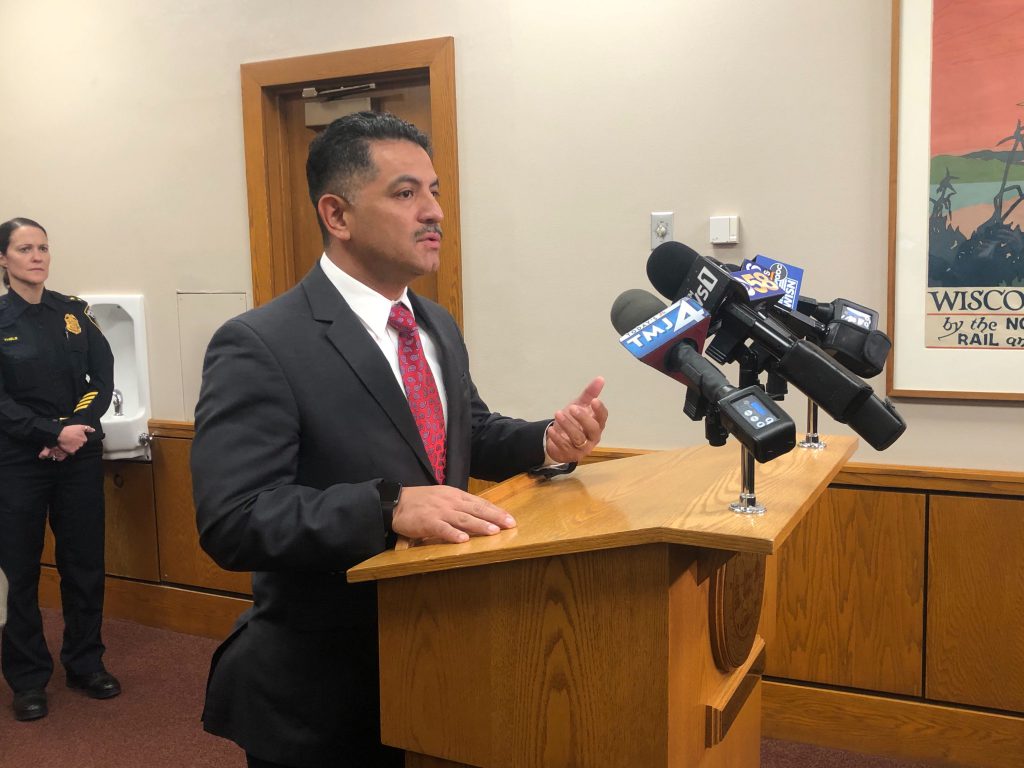Report Finds FPC Ignored City Attorney’s Advice
City Inspector General blames, adds more troubles for Fire & Police Commission.

Police Chief Alfonso Morales speaks at a press conference on the DNC. File photo by Jeramey Jannene.
The City of Milwaukee’s Inspector General issued a new report regarding the demotion of police chief Alfonso Morales that places additional blame on the board of the Fire & Police Commission and its former executive director.
While Morales already won a victory in court, with a judge ordering his reinstatement following a determination that he was denied due process in his demotion, the fallout continues within City Hall.
“Statements from commissioners suggest that opinions offered by the City Attorney were inconsistent and conflicting, while commentaries from the City Attorney’s Office… say that opinions were consistent and provided on numerous occasions,” wrote Inspector General Ronda Kohlheim in summarizing the conflict.
Kohlheim ultimately sided with the City Attorney.
“Founded on available evidence there is adequate information to conclude that the Board’s decision to demote Chief Morales was made despite opinions issued by the City Attorney’s Office, FPC Rule XV, and the citizen complaint procedure as set forth in §62.50(19),” wrote the inspector.
In reviewing what she said were hundreds of pages of documents, Kohlheim found that city’s legal team provided advice that the seven commissioners and executive director ignored.
The inspector general found that the City Attorney advised the commission in writing on the proper practice.
State law specifies that the board should have formed itself into a court to hold a trial on Morales’ conduct. Instead it issued 11 directives and then, before the timeline had run out on all of the directives, the commissioners unanimously voted to demote the chief.
City Attorney Tearman Spencer, in a filing on Morales’ case, admitted the FPC denied Morales due process in his demotion. Morales, who retired after being demoted, continues to work with the city on a possible settlement for the current situation.
“Testimonial evidence suggests that on at least two occasions the Board’s decision to demote the chief was exclusively based on an apparent assertion by the City Attorney ‘to do what needs to be done’ with assurance that the Board’s decision would be supported and defended by the City Attorney’s Office,” wrote Kohlheim.
It’s unclear who said that, and if it was ever put in writing. In conducting her investigation, Kohlheim reached out to eight individuals, but only two consented to interviews. She said from those interviews she was able to gain sufficient information. All of the names are redacted in the public version of her report.
Spencer did not respond to a request for comment.
The report doesn’t stop at finding an issue with the commissioners. It also faults former executive director Griselda Aldrete for poor record keeping.
“During the investigation, documentation and other records requested, maintained by the former Executive Director, were either not easily accessible or could not be located,” wrote Kohlheim.
The report also took issue with Aldrete’s practice of using the blind carbon copy (BCC) email function to send information to commissioners. Kohlheim said it made it difficult to determine who had received what information.
The council, even before the report was issued, seems to have had enough. A committee voted to reject Wilson’s reappointment. The full council delayed action until the inspector general’s report was ready.
What would happen if Wilson is rejected? Nothing, unless she resigns or a replacement is appointed. Her term expired in 2018 and she has continued to serve since then, including a period of over a year where she lived outside the City of Milwaukee.
Mayor Tom Barrett is backing her reappointment and told Urban Milwaukee, before the council delayed the vote on her, that his office was focused on keeping her on the commission. He said he judges all of the commissioners independently.
Spencer issued a new, confidential opinion to the commission in mid-January. But in announcing its existence, he also denounced a “culture of political finger-pointing, shifting blame, and promulgating unfounded, politically-charged statements” at City Hall.
Morales was given a four-year term as chief on December 18th, 2019 shortly after the council approved the appointment of Commissioner Raymond Robakowski. The commissioner, a former police officer, praised Morales. By July he had become Morales’ biggest critic. Then in October he resigned after accusing the commission chair, Nelson Soler, of behaving like a dictator.
The council, in January, confirmed Amanda Avalos to replace Robakowski. It also approved Leon W. Todd, III to serve as the executive director.





















